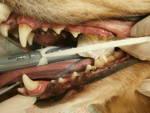
What is dental disease?
Bad breath is a big red flag indicating something is wrong in your pet’s mouth and should not be ignored. Broken teeth, red gums, excessive drooling or discharge/bleeding from the eye, nose or mouth are also abnormal. These can be symptoms of dental disease. Other signs may include facial swelling, pawing at the mouth, chattering jaw, chewing food on one side or reluctance to open or close the mouth. Although our pets may not tell us they are painful, dental disease hurts.
Dental disease is caused by bacteria below the gum line. It is a condition that will continue to worsen if left untreated. Dental disease can have negative effects on pets’ organs including the heart, lungs, liver, kidneys and joint; as bacteria from the mouth enters the bloodstream.
The good news is that this disease is reversible. When there is pain in the mouth, it is not the time to start trying to brush your pet’s teeth – it is time for a professional dental cleaning. During a physical exam, a veterinarian can diagnose dental disease, but anesthesia and dental x-rays are required to see the full picture below the gum line.
Dental cleaning when a cat or dog is awake does your pet a disservice, as only a fraction of tartar can be removed and is a cosmetic procedure only. As the pet is wiggling around, there is a greater chance of causing it harm. The teeth may look whiter, but the painful gum disease is still festering and can lead to tooth loss.
What is dental prophylaxis?
During a dental cleaning at a full service clinic such as Mitchell Veterinary Services, your pet is anesthetized to prevent it from wiggling around, control its pain and protect its lungs respiratory system from inhaling bacteria. A registered veterinary technician or veterinarian will probe the gum pocket to check for deep pockets that indicate disease around the tooth. If the pockets are small, scaling the teeth clean may be adequate therapy; but in more advanced cases surgical extraction is warranted. Root canals and complicated orthodontic cases are performed by a veterinary dental specialist on a referral basis. Teeth are polished and fluoride is applied. When the pet wakes up, it may have to eat softened food for several days, as the gums are tender. If teeth were extracted, the pet is sent home with pain medication. Home dental care and strategies to prevent dental disease are discussed during a post-operative visit.
It’s never too late to make the decision to control dental disease in your pets. Mitchell Veterinary Services encourages you to ask us about dental cleanings for your cat or dog in order to maximize a healthy, pain-free life for your pet.
See our educational articles on Dental Disease in Dogs and Dental Disease in Cats.
